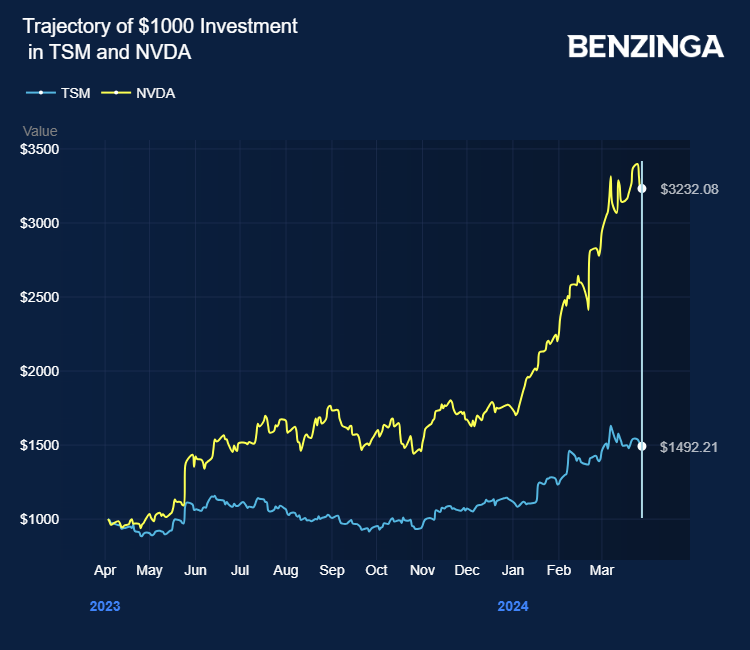Zinger Key Points
- TSMC eyes partnership with Kyushu University to tackle talent shortage, setting stage for future joint research.
- TSMC, leading in AI chip orders, anticipates a revenue boost of 24%-26% in 2024 amid high demand and advanced processes.
- Feel unsure about the market’s next move? Copy trade alerts from Matt Maley—a Wall Street veteran who consistently finds profits in volatile markets. Claim your 7-day free trial now.
Taiwan Semiconductor Manufacturing Co TSM is considering forging a comprehensive partnership with Kyushu University, likely for formalization by April. This collaboration aims to mitigate the semiconductor industry’s pressing talent shortage by engaging TSMC staff as educators at the Japanese institution’s Education Center for Semiconductors and Value Creation. The impending memorandum of understanding will lay the groundwork for potential future joint research endeavors, Nikkei Asia reports.
The key Nvidia Corp NVDA supplier has secured more than 90% of worldwide orders for AI chip production. With the surge in demand for AI chips and the application of cutting-edge manufacturing processes, TSMC is poised to significantly boost its performance, potentially raising its revenue by 24% to 26% year-on-year in 2024.

TSMC’s engagement with Kyushu University is strategically aligned with the operational commencement of its Kumamoto plant located on Kyushu, the southwestern island of Japan, which started its operations in February. The Ministry of Economy, Trade and Industry’s endorsement of a second plant in Kumamoto comes with a condition for TSMC to develop a semiconductor-focused curriculum at Kyushu University.
Kyushu University’s proactive measures include signing memorandums of understanding with Taiwan’s National Yang-Ming Chiao Tung University and Industrial Technology Research Institute in September, highlighting a collaborative spirit in the semiconductor education and research domain.
This initiative is in response to the projected annual deficit of 1,000 semiconductor-related professionals in Kyushu over the next decade, underscoring the critical need for specialized education and training in this high-demand field. Kumamoto University has also introduced a data science curriculum with a concentration in semiconductor devices, marking a significant step towards equipping the next generation of engineers with the necessary skills to sustain and advance the semiconductor industry.
Recent developments reveal TSMC facing unexpected obstacles in enhancing the American semiconductor supply chain, marked by construction hold-ups impacting essential suppliers in Arizona. The root causes of these delays include escalating construction expenses, a scarcity of labor, and a variety of operational challenges, all further entangled with the distinct regulatory, environmental, and safety hurdles of constructing chemical facilities.
In response to these challenges, TSMC has outlined plans to construct factories for 2-nanometer chips in the Taiwanese cities of Hsinchu and Kaohsiung. Additionally, TSMC is considering the development of a second facility in Kumamoto, Japan, with an anticipated investment of $13.5 billion.
The stock gained 47% in the last 12 months. Investors can gain exposure to the stock via VanEck Semiconductor ETF SMH and Vanguard FTSE Emerging Markets ETF VWO.
Price Action: TSM shares traded higher by 1.08% at $137.52 premarket on the last check Monday.
Disclaimer: This content was partially produced with the help of AI tools and was reviewed and published by Benzinga editors.
Photo by Sundry Photography on Shutterstock
Edge Rankings
Price Trend
© 2025 Benzinga.com. Benzinga does not provide investment advice. All rights reserved.
Trade confidently with insights and alerts from analyst ratings, free reports and breaking news that affects the stocks you care about.